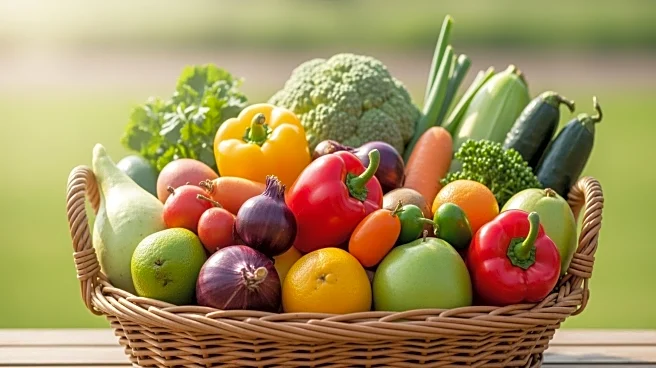What's Happening?
Chef José Andrés, along with 28 World Food Prize Laureates, has issued a joint statement calling for a significant increase in funding for emergency food aid and sustainable agricultural investment. This
announcement was made during the 2025 Norman E. Borlaug International Dialogue. The group emphasized the collective responsibility to address global hunger, urging action rather than mere words. Andrés, known for his humanitarian efforts through World Central Kitchen, highlighted the importance of food as a human right and the need for resilient food systems. The dialogue also featured discussions on humanitarianism and innovation, with contributions from Gov. Tom Vilsack and other global leaders.
Why It's Important?
The call for increased investment in emergency food aid and sustainable agriculture is crucial in addressing global hunger and food insecurity. By doubling funding, the initiative aims to empower local solutions and build resilient food systems, which are essential in crisis situations. This effort could significantly impact communities worldwide, providing necessary resources to combat hunger and support sustainable agricultural practices. The involvement of influential figures like Chef José Andrés and World Food Prize Laureates underscores the urgency and importance of this initiative, potentially influencing policy changes and international support.
What's Next?
The joint statement by Chef José Andrés and the World Food Prize Laureates is expected to prompt discussions among international stakeholders, including governments and non-profit organizations, to increase funding and support for food aid and agricultural investment. Future dialogues may focus on specific strategies to implement these changes, with potential collaborations between humanitarian groups and agricultural experts. The initiative could lead to policy shifts and increased international cooperation to address food insecurity and promote sustainable agriculture.
Beyond the Headlines
The emphasis on sustainable agriculture and emergency food aid highlights broader issues such as climate change, resource management, and global inequality. By advocating for resilient food systems, the initiative addresses the interconnected challenges of environmental sustainability and social justice. This approach may inspire further innovations in agricultural technology and practices, contributing to long-term solutions for global food security.









